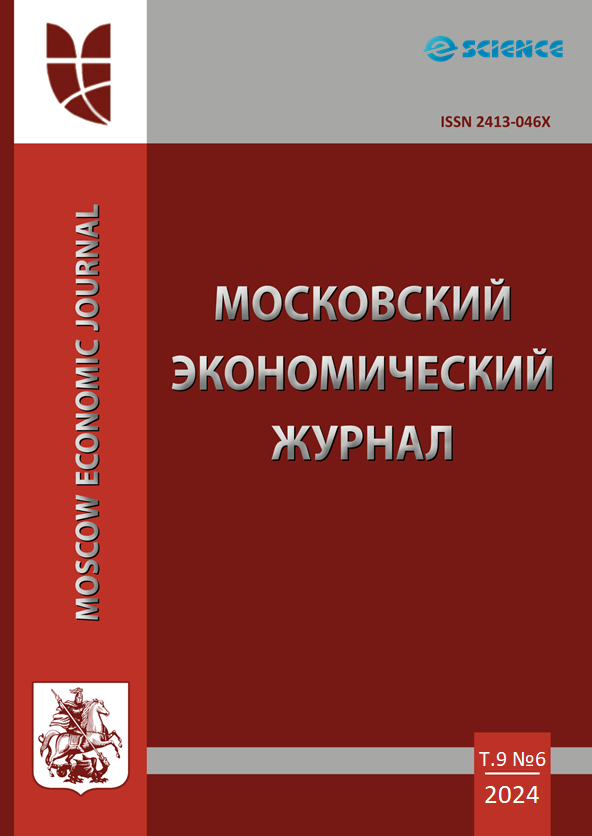Russian Federation
UDC 338.24
Data analysis using artificial intelligence helps specialists solve problems and make strategic decisions. With the help of LCA, an overall life cycle analysis is performed, but more attention needs to be paid to environmental indicators. As, for example, in E-LCA. Also, the use of AI in production at various stages of the product life cycle helps to adhere to sustainability, which is a necessary agenda for development and competitiveness. The closed-loop economy aims to minimize waste, allocate resources correctly, and transition to reuse. Optimizing resources and minimizing costs are two areas that require new approaches to their modernization. Machine learning provides a great perspective for optimizing these processes, and the use of AI in analytics helps to adjust changes quickly and with greater accuracy. Which technologies can be used to analyze large amounts of data more efficiently. There are already a number of AI technologies that are used to automate lifecycle management processes. As a result of the analysis in production, certain production processes can be upgraded or adjusted. As well as assist in predictive analytics and operational control and quality management. The introduction of AI technologies has extensive prospects for improving production efficiency. Also, the use of AI-based LCA will have a positive effect in automation and efficiency of decision-making and increase the sustainability of production. The article examines the possibilities of using AI in the analysis and management of the product lifecycle in production. Current and prospective assessment systems based on environmental indicators are considered and opportunities for the introduction of machine learning into software to optimize resources and improve work efficiency throughout the product lifecycle are identified using practical examples. The purpose of the scientific article is to investigate the use of artificial intelligence in product lifecycle management. It is necessary to understand how effective and possible the implementation of AI is to achieve results and what problems may arise.
sustainable development, industrial enterprises, Artificial intelligence (AI), Closed-loop economy
1. Batova N., Sachek P., Tochickaya I. Na puti k zelenomu rostu: okno vozmozhnostey cirkulyarnoy ekonomiki. Centr ekonomicheskih issledovaniy BEROK (BEROC). 06.06.2018. – S.12-16.
2. Val'ko D.V. Cirkulyarnaya ekonomika: ponyatiynyy apparat i diffuziya koncepcii v otechestvennyh issledovaniyah // Nauchnyy zhurnal NIU ITMO. Ser. Ekonomika i ekologicheskiy menedzhment. – 2019. – № 2. – c. 42-49..
3. Towards a circular economy – Waste management in the EU / European Parliamentary Research Service.Scientific Foresight Unit (STOA). PE 581.913. 2017
4. Elektronnyy resurs [http://www.ecopolicy.ru/upload/File/Usligi.pdf]
5. Vismet H. Sistemnye preobrazovaniya dlya biznesa v kontekste perehoda k ekonomike zamknutogo cikla // Forsayt. – 2020. – № 4. – c. 47-60.
6. Chen P.-H., Ong C.-F., Hsu S.-C. Understanding the relationships between environmental management practices and financial performances of multinational construction firms. Journal of Cleaner Production, 2016. vol. 139, pp. 780-784.
7. Parida, V.; Sjödin, D.R.; Wincent, J.; Kohtamäki, M. (2014). Mastering the transition to product-service provision: Insights into business models, Learning activities, and capabilities. // Research-Technology Management. Vol 57, 2014- Issue 3 . P. 44–52.
8. Digital Operating Model. A structured approach to choosing and implementing new technologies. Monitor Deloitte. Issue 02.2020. p. 22
9. NAVSTREChU «ZELENOY» EKONOMIKE ROSSII (OBZOR) Institut ustoychivogo razvitiya Obschestvennoy palaty Rossiyskoy Federacii. Centr ekologicheskoy politiki Rossii. 2012 g.











